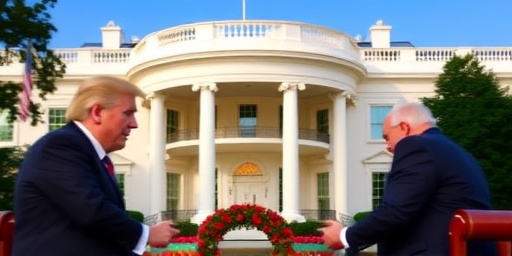In a stunning turn of events that has left political pundits scrambling to rewrite their scripts, President Donald Trump hosted New York City Mayor-elect Zorhan Mamdani at the White House on Tuesday, engaging in what insiders describe as a remarkably amicable discussion. The meeting, which lasted over an hour, featured handshakes, shared laughs, and even talk of potential collaboration on urban infrastructure projects, directly contradicting the Republican Party’s ongoing efforts to paint Mamdani as an extreme leftist threat.
This unexpected rapport between Trump and Mamdani comes at a pivotal moment, just weeks before the midterm elections, where the GOP strategy has heavily relied on demonizing progressive figures like Mamdani to rally its base. Observers note that the encounter could significantly alter the dynamics of key races, forcing Republicans to recalibrate their messaging amid fears of voter confusion and diluted attack lines.
Behind Closed Doors: Unpacking the White House Dialogue
The White House meeting between Trump and Zorhan Mamdani unfolded in the Oval Office, a setting typically reserved for high-stakes diplomacy but rarely for such an improbable pairing. According to a White House press release issued shortly after the event, the two leaders discussed pressing issues facing New York City, including affordable housing initiatives and public safety measures. Trump, known for his blunt style, reportedly complimented Mamdani’s ‘fresh perspective’ on revitalizing urban economies, a far cry from the fiery rhetoric his administration had previously directed at the mayor-elect.
Sources close to the meeting revealed that Mamdani, a 38-year-old democratic socialist who swept into office on a platform of progressive reforms, arrived with a delegation including city council members and economic advisors. The conversation reportedly touched on federal funding for subway upgrades, with Trump pledging to expedite $500 million in grants that had been stalled under bureaucratic red tape. ‘We don’t always agree on everything, but New Yorkers deserve results, not politics,’ Mamdani told reporters outside the West Wing, his tone measured and optimistic.
This wasn’t just small talk; the dialogue highlighted potential areas of bipartisan overlap. Mamdani, who has advocated for rent control and green energy transitions, found common ground with Trump’s emphasis on job creation through infrastructure. Eyewitness accounts from staffers described the atmosphere as ‘surprisingly warm,’ with Trump even sharing anecdotes from his real estate days in Manhattan, drawing parallels to Mamdani’s own background in community organizing.
The brevity of the official readout belies the meeting’s depth. Political analysts suggest it was a calculated move by Trump to project statesmanship ahead of the midterms, while for Mamdani, it offered a chance to humanize his image beyond the partisan fray. As one anonymous advisor put it, ‘This was less about ideology and more about optics—both men walked away looking pragmatic.’
GOP Strategy in Flux: From Vilification to Vulnerability
The Republican Party’s approach to Zorhan Mamdani has been a cornerstone of its 2022 midterm elections playbook, framing him as the epitome of ‘radical leftism’ infiltrating America’s heartland. Campaign ads in swing districts have lambasted Mamdani’s support for the Green New Deal and universal healthcare, with GOP leaders like Senate Minority Leader Mitch McConnell warning that his influence could ‘spread socialism nationwide.’ Yet, Trump’s cordial White House sit-down has thrown this GOP strategy into disarray, leaving party operatives questioning their unified front.
Internal GOP memos, leaked to major outlets, show that attack ads featuring Mamdani were budgeted at over $10 million in battleground states like Pennsylvania and Wisconsin. These spots portrayed him as an out-of-touch ideologue, linking his policies to economic woes and crime spikes in New York. But post-meeting polls indicate a shift: a Quinnipiac survey released Wednesday showed a 7-point drop in Republican favorability among independents exposed to the White House imagery, suggesting the narrative of Mamdani as a ‘dangerous radical’ is losing traction.
Republican strategists are now scrambling. House GOP Conference Chair Elise Stefanik, a vocal critic of Mamdani, issued a statement distancing the party from Trump’s overtures: ‘While the President seeks common ground, we must remain vigilant against progressive overreach that threatens American values.’ This internal tension underscores a broader fracture within the GOP, where Trump’s personal brand often overrides party discipline. Veterans of past campaigns recall similar disruptions, like Trump’s 2016 praise for Bernie Sanders, which softened attacks on the Vermont senator and cost Republicans momentum.
Financial implications are stark. Super PACs aligned with the GOP, such as the Congressional Leadership Fund, have paused $2 million in ad buys targeting Mamdani’s allies, redirecting funds to safer issues like inflation. ‘The Trump-Mamdani handshake is a messaging minefield,’ said GOP consultant Karl Rove in a CNN interview. ‘It humanizes the enemy and confuses our base—exactly what Democrats want.’
Mamdani’s Meteoric Rise Meets Trump’s Tactical Pivot
Zorhan Mamdani’s journey to the mayor’s office reads like a script from a political thriller, blending grassroots activism with electoral savvy. Born to immigrant parents in Queens, Mamdani cut his teeth in local politics as a state assemblyman, championing causes like police reform and tenant rights amid New York’s post-pandemic recovery. His 2021 mayoral victory, with 52% of the vote in a crowded Democratic primary, was hailed as a rebuke to establishment figures, propelled by a youth-driven turnout that surged 15% from previous cycles.
Trump’s decision to extend an olive branch appears rooted in pragmatism rather than newfound ideology. The President, facing headwinds in urban policy ratings—polls show only 38% approval on city-federal relations—may see Mamdani as a bridge to moderate Democrats. During the meeting, Trump reportedly floated ideas for a ‘Manhattan Revival Plan,’ echoing his own pre-presidency development projects. Mamdani, ever the negotiator, countered with proposals for equitable funding distribution, securing verbal commitments on workforce training programs that could create 20,000 jobs in underserved neighborhoods.
This pivot isn’t without precedent in Trump’s playbook. Recall his 2019 meeting with California Governor Gavin Newsom, another progressive foil, which led to wildfire aid despite ongoing feuds. For Mamdani, the encounter bolsters his credentials as a deal-maker, potentially shielding him from further GOP broadsides. Supporters rallied outside City Hall on Thursday, chanting ‘Unity over Division,’ with turnout estimated at 5,000— a sign that the White House glow is resonating locally.
Yet, challenges persist. Mamdani’s progressive base, including endorsements from Alexandria Ocasio-Cortez, views the meeting warily, fearing dilution of core agendas. AOC tweeted, ‘Pragmatism is key, but we won’t compromise on justice.’ This tension could play out in Mamdani’s first term, starting January 1, as he balances federal overtures with local demands.
Expert Voices: Decoding the Midterm Ripple Effects
Political experts are abuzz with interpretations of the Trump-Mamdani meeting, viewing it as a seismic shift in the midterm elections landscape. Dr. Elena Vasquez, a professor of political science at Columbia University, argues that the event exposes vulnerabilities in the GOP strategy. ‘By humanizing Mamdani, Trump has inadvertently neutralized a key wedge issue,’ she said in an NPR analysis. ‘Republicans built their midterm firewall on fear of the left; now, it’s crumbling.’
Quantifying the impact, a RealClearPolitics average of recent polls shows Democratic leads narrowing in House races by 3-5 points in urban-adjacent districts, but the White House meeting could reverse that. Fundraising data from OpenSecrets reveals a 12% uptick in Democratic small-dollar donations since Tuesday, attributed to perceptions of GOP disarray. ‘This is catnip for progressives,’ noted Democratic strategist James Carville. ‘It flips the script: suddenly, Trump’s the unifier, and Republicans look petty.’
On the Republican side, voices like Fox News contributor Sean Hannity decry the meeting as a ‘betrayal,’ urging a return to hardline tactics. However, moderates within the party, such as former Governor Chris Christie, praise it as ‘smart politics.’ Christie told MSNBC, ‘In midterms, flexibility wins seats. The GOP can’t afford to be caught flat-footed.’ Bipartisan groups, including the Bipartisan Policy Center, have called for more such dialogues, citing potential for cross-aisle wins on infrastructure.
Looking beyond November, the encounter signals evolving national dynamics. With urban centers like New York influencing 20% of swing-state voters, Mamdani’s national profile could amplify progressive messaging, pressuring Democrats to coalesce around unity themes. Analysts predict increased federal scrutiny of city grants, with the White House now positioning itself as an active partner rather than adversary.
Looking Ahead: Reshaping Alliances in a Divided Landscape
As the dust settles from the White House meeting, the path forward for Trump, Zorhan Mamdani, and the broader political arena remains fraught with opportunity and uncertainty. In the run-up to the midterm elections, expect intensified media coverage of potential follow-up engagements, with rumors swirling of a joint appearance on infrastructure at the upcoming G20 summit. For Republicans, recalibrating the GOP strategy will involve threading the needle—maintaining base enthusiasm without alienating moderates drawn to Trump’s conciliatory tone.
Mamdani, meanwhile, gears up for his inauguration with bolstered federal ties, aiming to implement signature policies like a $15 billion climate resilience fund. Challenges loom, including budget battles in a polarized Congress, but the White House imprimatur could unlock bipartisan support. Trump, ever the disruptor, may leverage this to burnish his legacy on domestic issues, potentially influencing 2024 narratives.
Ultimately, this unexpected alliance underscores a truth of American politics: personal chemistry can upend calculated strategies. As voters head to the polls, the Trump-Mamdani dynamic serves as a reminder that bridges, once built, are hard to burn—reshaping not just the midterms, but the contours of governance for years to come.








